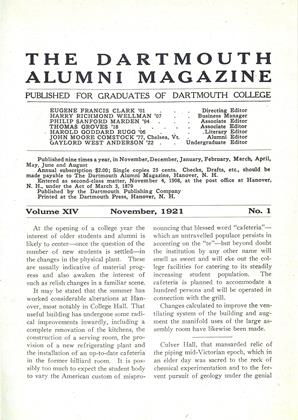Princeton, Oct. 5, 1921.
To the Editor of the ALUMNI MAGAZINE:
Dear Sir:—A year ago in the November issue of the MAGAZINE a propostion was brought out to assign seats, at the more important football games, to classes in the order of classes. This proposition received some favorable comment in subsequent issues of the MAGAZINE but there was no general expression of opinion for or against the plan. This seeming indifference is very probably to foe explained by the inertia of alumni who may approve or condemn a proposition without experiencing an irresistible desire. to burst into print on the subject. The writer has discussed the proposed plan with a number of alumni who have approved it. So far as can be ascertained the opposition comes from members of the athletic council who, sitting as judges upon such matters, have apparently construed the inertia of the alumni as disapproval of the plan.
Last fall when the proposition was first presented at Hanover to one closely in touch with the council objections were instantly forthcoming. The writer was informed that the scheme was impossible, that it had not been heard of, and that Harvard did not assign seats that way. A member of the council stated further that "the alumni did not want it." The psychology of these replies was more interesting than their merit. As the proposition was new and had not been presented to the alumni, no one could be sure that they did not want it. The objections simply showed that the objectors themselves did not approve of the plan.
Subsequently the council considered the proposition at its fall meeting. The abjections were stated in a letter to the present writer. First it was felt that the proposed distribution of seats would encourage the younger Dartmouth men to make fraudulent application through older alumni for the purpose of getting better seats. Secondly, it was thought that the younger men had a right to good seats. There was no evidence of a discussion of the effect which such seating of alumni would have upon collective college spirit.
In the June issue of the MAGAZINE appeared a summary of a discussion of the scheme which occurred in Hanover at the spring meeting of the class secretaries. It is to be regretted that the speaker for the council has not as yet found an opportunity to prepare his own statements of the objections to the plan which he gave at that time. From the summary in the MAGAZINE it appears that the policy of the council in the matter is to satisfy a majority of the alumni by giving everyone a chance at least to obtain a good seat, and incidentally to permit a group of friends to sit together. It is a matter for regret that the council had apparently no comment to make upon the effect of the proposed seating upon collective college spirit. Does the council see any advantage in grouping classmates at alumni luncheons in Hanover? Did it disapprove of the announcement made last spring of a dinner of Dartmouth men in New York which advertised that Dartmouth men would be seated by classes ?
The discussion has however had some effect but not the maximum. In the circular recently sent out with application blanks for seats at the forthcoming games there is a paragraph in italics to the effect that, upon notification from the secretary of any class that his class expects to hold a formal reunion at the time of a game, the class may sit together. This is a poor compromise, a poor substitute for the original proposition which is solidly based upon a desire to foster group spirit. The distribution of seats by classes should work automatically for every class without any con- sideration for the alumnus who does not wish to, sit with his class. Anyone who claims that the majority of a given class, or that the alumni who go back to Hanover for reunions do not wish an informal reunion at the games, has a difficult claim to establish.
The original proposition is again urged as the only fair and expedient one; fair, because the sequence of classes is the only determining factor in a democratic assignment of seats; expedient because it offers a great opportunity for renewing and fostering collective college spirit on a large scale at a most favorable moment.
The council has merely to give the plan a fair trial. Then if there mount up to the blue firmament curses and cries of anguish, it will be easy to revert to the present method of tossing the tickets up in a crowd. A fair trial will not involve hardship for any Dartmouth man.
 View Full Issue
View Full Issue
More From This Issue
-
 Article
ArticleTHE UNDERGRADUATE'S RELATIONSHIP TO THE COLLEGE
November 1921 By ERNEST MARTIN HOPKINS -
 Article
ArticleAt the opening of a college year the
November 1921 -
 Sports
SportsFOOTBALL
November 1921 -
 Article
ArticleTWO DISTINGUISHED VERMONT ALUMNI
November 1921 By JAMES FAIRBANKS COLBY '72 -
 Article
ArticleMEMORIAL FIELD FAST BECOMING A REALITY
November 1921 -
 Class Notes
Class NotesCLASS OF 1905
November 1921 By Fletcher Hale








